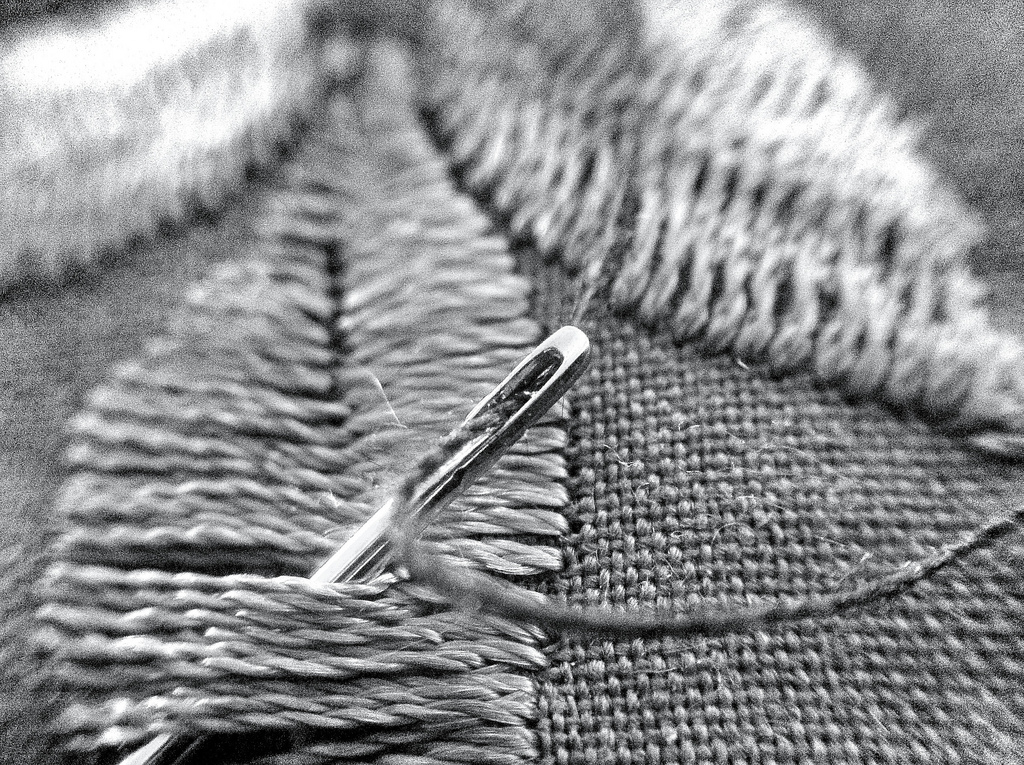If, as Michael Bérubé suggested today in his Chronicle of Higher Education article “The Humanities, Unraveled,” the situation in the humanities is “a seamless garment of crisis: If you pull on any one thread, the entire thing unravels,” then stitching in any one area just may save the garment as a whole.
By the end of the article, Bérubé is worried that departments will be “eliminated in the next strategic plan” if they take up in earnest the Alternative Academic career (#AltAc) challenge by empowering their graduate students to cultivate a wider range of abilities that would enable them to pursue career paths other than those along the tenure track.
The crisis is real, as is the concern about elimination; but the rhetoric of crisis can stymie creativity at the very moment when we need to be most imaginative. Happily, those of us with disciplinary backgrounds in the humanities have long cultivated our capacities of creative stitching. We should draw on them to begin sewing again, rather than lamenting our collective unraveling.
Take one idea: to create a robust, integrated higher education internship program for humanities graduate students in areas like Institutional Research, Fellowships and Awards, Teaching and Learning with Technology, Admissions, Alumni Relations and Development, Career Services and other aspects the higher education landscape. These areas are in constant need of the writing, communication and imaginative thinking talents our humanities graduate students bring with them.
The point would not be to take students away from rigorous new scholarship in their disciplines; but to recognize, as Bérubé does, that advanced study of the humanities develops powerful analytic, creative, penetrating and broad intellectual abilities that can have transformative effects on institutions and cultures in which they are valued.
This is just one example of how stitching in one area might help save and transform the entire garment, for the more people with advanced degrees in the humanities serving at various levels of our institutions — be they in higher education, government, or the profit or non-profit worlds — the more conscientious and humane those institutions will become.


I really like these ideas, but my concern is (and has been for a while), the 75% of faculty (largely in the humanities) who are off the tenure track. Many are no longer in graduate school, and these kinds of opportunities need to be extended/targeted to them. We help re-train workers who lose their manufacturing jobs, and we completely ignore the very real job relocation problems faced by adjuncts. I fear for a lost generation of academics, with tenured professors sitting pretty and the next generation of PhD students better equipped to meet the challenges. Higher education has completely abdicated their responsibility to the thousands of PhDs and MA students who they "trained" for jobs that don't exist. They have been stitching together their meager existences for a long time. I think it's time for the academy to step in a lend a hand.
Thanks, Lee, for the comment. The stitching needs to happen in multiple places at the same time, though part of my point was that stitching in one area can have implications for the whole garment – to continue the metaphor Michael used in the Chronicle. Here I was trying to address the specific issue of how we train our current graduate students in the humanities.
Your concern about a possible lost generation of trained humanities scholars is an important one too. Part of the stitching there involves establishing fair, reliable teaching positions with specifiable career paths and benefits. It also involves a culture shift in which tenure line faculty become more sensitive to and appreciative of the very important contributions that our lecturers make to the academic mission of our colleges and universities.
I think that these very happenings/struggles call into question whether or not:
"advanced study of the humanities develops powerful analytic, creative, penetrating and broad intellectual abilities that can have transformative effects on institutions and cultures in which they are valued. ", one might even view this whole question of re-organizing (via markets or otherwise) as a series of test cases for such claims by faculty so we shall see how they respond…
This is just one example of how stitching in one area might help save and transform the entire garment